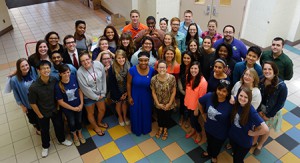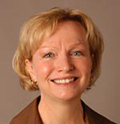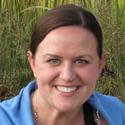 A first-of-its-kind alternative teacher preparation program, created by the University of Minnesota’s College of Education and Human Development (CEHD), has been granted conditional approval by the Minnesota Board of Teaching (BOT). The program is designed to provide high quality teacher preparation for individuals who need to continue working during their preparation or who come to the field of teaching after earning a degree in another major. A cohort of 38 Teach for America (TFA) corps members (see photo) will be the first enrolled in the program.
A first-of-its-kind alternative teacher preparation program, created by the University of Minnesota’s College of Education and Human Development (CEHD), has been granted conditional approval by the Minnesota Board of Teaching (BOT). The program is designed to provide high quality teacher preparation for individuals who need to continue working during their preparation or who come to the field of teaching after earning a degree in another major. A cohort of 38 Teach for America (TFA) corps members (see photo) will be the first enrolled in the program.
The board decision means the first cohort will move forward with an eight-week summer residency in Minneapolis and a partnership with the Northside Achievement Zone (NAZ), which includes co-teaching with experienced instructors. The program continues beyond this summer for an additional two years of coursework and professional development.
The program began on June 2 under a BOT-granted discretionary variance approved in May. The conditional approval means the BOT requires additional explanation on some state standards before full approval is granted.
Teacher candidates in the TFA cohort will be prepared in four areas: secondary science, secondary mathematics, K-12 English-language learners and elementary teaching. The corps members will be held to the same standards as those in the comprehensive U of M teacher education programs, according to Deborah Dillon, CEHD associate dean for graduate, professional and international programs.
 “This program will allow us to work with our first partners—TFA and the Northside Achievement Zone— in an innovative and flexible way to create the highest quality experience possible and to best prepare this cohort of teachers,” said Dillon. “This is the latest research-based development in our college’s history of creating innovative teacher preparation models for over a century.”
“This program will allow us to work with our first partners—TFA and the Northside Achievement Zone— in an innovative and flexible way to create the highest quality experience possible and to best prepare this cohort of teachers,” said Dillon. “This is the latest research-based development in our college’s history of creating innovative teacher preparation models for over a century.”
Candidates who are admitted into TFA (which recruits high-achieving college graduates and professionals to teach in high-needs schools) and who meet U of M admission requirements begin teaching this fall with a limited-term teaching license. In addition to the eight-week summer residency (which is longer than the usual five-week TFA summer institute), corps members will have more hours as the instructional leader in front of students and more time working directly with teaching mentors. With nearly two hours of lead teaching per day, the new summer residency increases the pre-service teaching experience of corps members compared to the current model.
Corps members who successfully complete the summer residency and two additional years of study, and who meet the rigorous standards and assessments at the U of M and the state of Minnesota, may be recommended by the U of M for a regular full-time teaching license. These candidates will also have the option of earning additional credits to receive a master’s degree, as do students in the U of M’s comprehensive teacher education programs.
 “Our comprehensive program design informed this new alternative program,” said CEHD Dean Jean Quam. “We have huge challenges in our K-12 education systems now that require us, as part of our land-grant commitment to the state, to create additional routes to teaching and to attract a broader diversity of candidates.”
“Our comprehensive program design informed this new alternative program,” said CEHD Dean Jean Quam. “We have huge challenges in our K-12 education systems now that require us, as part of our land-grant commitment to the state, to create additional routes to teaching and to attract a broader diversity of candidates.”
TFA approached the U of M in 2013 to explore developing a partnership under a 2011 law that created alternative pathways for teacher licensure in Minnesota.
 “We are excited to work side by side with the University in a program that shows collaboration in working to solve our most complex challenges in education for the benefit of students and teachers,” said Crystal Brakke, executive director of TFA-Twin Cities.
“We are excited to work side by side with the University in a program that shows collaboration in working to solve our most complex challenges in education for the benefit of students and teachers,” said Crystal Brakke, executive director of TFA-Twin Cities.
The goals of the “Alternative Pathway to Teaching Program: University of Minnesota-Teach For America Partnership” include preparing effective teachers based on current research in teacher development, focusing on support for student learning grounded in principles of equity and cultural responsiveness, and preparing candidates to teach in diverse settings, such as NAZ, which is a federal Promise Neighborhood. Developing participants’ long-term commitment to teaching is another goal.
“We want to prepare individuals who will teach beyond their initial two-year commitment, who will want to stay in the classroom and in education long into their careers,” said Dillon, “and we believe that will happen because our candidates will be well-prepared and supported as they learn to teach and develop as new educators.”
TFA corps members will pay a fee to the University for program delivery and supervision. Any revenues generated will be invested in research that allows CEHD to study how to most effectively improve alternative models.
See a short video about the program on the CEHD YouTube site .



